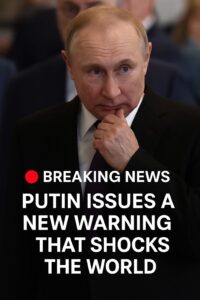
In a statement that immediately drew global attention, Russian President Vladimir Putin said that Russia is prepared to restart nuclear testing if the United States conducts one first. The declaration revived Cold War-era fears and added fresh tension to an already fragile world order.
According to Russian media, the president described the move as a “conditional response,” insisting that Moscow would not act unless Washington did. Still, his tone made clear that the Russian nuclear infrastructure remains active and ready for immediate use if needed.
Experts note that no Russian explosive nuclear test has taken place since October 1990, when the last Soviet test was conducted at the Novaya Zemlya site. Since then, both Moscow and Washington have adhered to an informal moratorium on testing. The Comprehensive Nuclear-Test-Ban Treaty (CTBT) prohibits such tests, but it has never formally entered into force because several key states—including the United States—have not ratified it.
The Kremlin’s latest rhetoric is widely viewed as political signaling rather than an imminent military step. Analysts in Moscow and Washington argue that the comment was designed to pressure Western governments as tensions over Ukraine and global security guarantees continue to rise.
“Putin is reminding everyone that Russia still has the full capability to conduct tests and modernize its arsenal,” said one international-relations researcher. “It’s a show of readiness, not an announcement of intent.”
Still, the possibility of a nuclear test—after more than three decades of restraint—has alarmed world leaders. NATO officials called the remarks “deeply irresponsible,” while independent experts warned that even sub-critical or simulated tests could escalate suspicion between major powers.
For now, there is no verified sign of new activity at known Russian testing sites. Satellite imagery shows only routine maintenance and logistical operations, but Western intelligence agencies continue to monitor Novaya Zemlya closely.
If Russia were to carry out an actual nuclear detonation, it would mark the first time since the collapse of the Soviet Union that any major nuclear power deliberately broke the global moratorium. The political cost would be immense, and the strategic consequences unpredictable.
As of today, the world watches and waits. Whether Putin’s statement becomes another line in his long history of deterrence—or the beginning of a new nuclear chapter—depends largely on the next move from Washington.